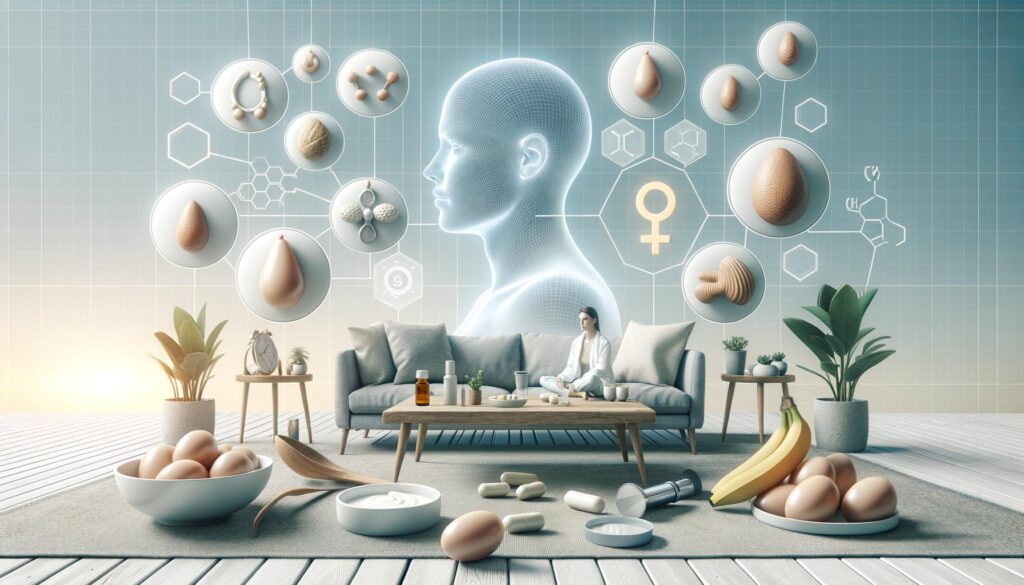Understanding Low Estrogen Levels: Causes, Symptoms, and Solutions

The Role of Estrogen in Women’s Health
Estrogen is a crucial hormone primarily associated with the female reproductive system, but its influence extends to several bodily functions. This hormone, produced mainly in the ovaries, plays a key role in regulating the menstrual cycle and supporting reproductive health. Beyond reproduction, estrogen contributes to maintaining bone health, influencing mood regulation, and supporting brain function. In addition, estrogen has a protective effect on the cardiovascular system and helps maintain skin elasticity and hydration. Understanding its expansive role highlights the importance of maintaining balanced estrogen levels for overall well-being.
Causes of Low Estrogen Levels
Various factors can lead to reduced estrogen levels, which often affect women differently based on age and life stages. Common causes include:
- Menopause: A natural decline in estrogen production occurs as women age, leading to menopause, typically around the age of 50.
- Premature Ovarian Failure: This condition causes the ovaries to stop functioning properly before age 40, resulting in decreased hormone production.
- Polycystic Ovary Syndrome (PCOS): This endocrine disorder affects ovarian function and can cause hormonal imbalances.
- Intensive Physical Training: High levels of exercise without adequate nutrition can disrupt hormone production.
- Certain Medications: Some cancer treatments and hormonal therapies can lower estrogen levels.
Identifying the underlying cause is crucial for determining the appropriate treatment or management strategy for low estrogen levels.
Signs and Symptoms of Low Estrogen
The symptoms of low estrogen can vary widely, but they often impact both physical and emotional health. Common symptoms include:
- Irregular or absent menstrual cycles: Hormonal imbalances can disrupt menstrual regularity.
- Hot flashes and night sweats: Often experienced during menopause due to fluctuating hormone levels.
- Vaginal dryness and discomfort: Reduced estrogen affects vaginal tissue, impacting lubrication and elasticity.
- Decreased libido: A decrease in sexual desire can be related to hormonal changes.
- Mood swings and depression: Estrogen influences neurotransmitters that regulate mood, and imbalances can lead to mental health challenges.
These symptoms can significantly impact daily life, and recognizing them is the first step toward seeking appropriate care.
Managing and Treating Low Estrogen Levels
Various strategies can help manage low estrogen levels, with treatment often tailored to the individual’s needs and underlying causes. Options may include:
- Hormone Replacement Therapy (HRT): This treatment involves taking supplemental estrogen to mitigate symptoms and maintain hormonal balance, often prescribed during menopause.
- Lifestyle Modifications: Incorporating a healthy diet, regular exercise, and stress management techniques can support overall hormonal health.
- Alternative Therapies: Some individuals find relief with acupuncture, herbal supplements, or mindfulness practices, though it’s essential to discuss these with a healthcare provider.
Consulting with a healthcare provider is crucial to assess symptoms and develop a personalized treatment plan that addresses individual health goals and concerns.
Long-Term Health Implications of Low Estrogen
Consistently low estrogen levels can lead to long-term health consequences beyond immediate symptoms. Key areas of concern include bone health, as estrogen deficiency increases the risk of osteoporosis and fractures. Additionally, cardiovascular health can be compromised, as estrogen plays a role in maintaining cholesterol levels and vascular function. Furthermore, cognitive health may be impacted, with some studies suggesting links between low estrogen and cognitive decline. Addressing low estrogen proactively is critical to prevent these potential health challenges and to support overall quality of life.
Conclusion: Taking Control of Hormonal Health
Understanding the various aspects of low estrogen levels is essential for women at different life stages. By recognizing symptoms early and consulting healthcare professionals, women can make informed decisions about their health. Whether through lifestyle changes, hormone therapy, or alternative treatments, effective management of low estrogen levels can significantly enhance quality of life. Taking proactive steps towards maintaining hormonal balance is crucial for supporting physical, emotional, and long-term health.
